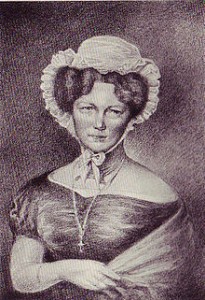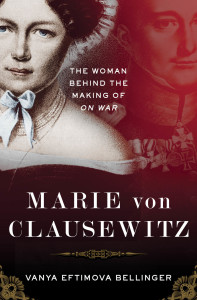About My Blog
My book is already out!
You can read some of the reviews:
You can find my book on Amazon.com
Please do let me know what you think
This is a blog following my work on a biography of Marie von Clausewitz, born Countess von Brühl, Carl vonClausewitz’s wife of 21 years and the post-mortem publisher of On War.
Here you will find interesting facts and quotes that I have come across in my research. Additionally, I plan to post pictures and short dispatches from my trips to Germany and other places in Europe where they lived. Since my day job is a journalist, from timeto time you might find some references to current events (although I’ll try to curb my enthusiasm). I am also looking forward for your feedback and suggestions.

While studying German at the Language School in my home country of Bulgaria, I became passionately interested in the ideas and works of the German Romanticism. Years later, while attending Graduate School in the United States, I discovered my language skills served me well compared to my cohorts who struggled with the dialectic style and highly condensed language of On War. Being a foreigner in a class full of American students, who obviously spoke better English and did not need to google every cultural reference the professor made, my interest (yes, even love) to debate Clausewitz became my strongest asset.
While studying the Prussian officer’s work and life, I also became fascinated by his wife, Marie. She was the love of his life, best friend, and played a crucial role in the publishing of On War. Marie was the granddaughter of Saxony’s illustrious prime minister and Frederick the Great’s bitter enemy during the Seven Years’ War, Heinrich von Brühl, a Berlin socialite, well educated and highly intelligent. Marrying Clausewitz, a talented officer but with dubious claims of nobility, she actually married down. It turned out to be a happy union that, by extend, created the conditions for the creating of On War. Carl was audacious and unyielding; yet he clearly had a tendency to dream big and strain the social limits. Marie provided him with comfort, confirmed his dreams, and most importantly, she kept his aspirations on the track to success.

A little bit about my project:
Scholars have often praised the relationship between Carl and Marie as extraordinary and among equals, but it has remained rather understudied. I would argue that without understanding the dynamics of this relationship, one cannot understand Clausewitz’s life, achievements, and legacy.
I also believe that for the most modern readers the greatest difficulty in understanding Clausewitz’s ideas and On War comprises in little to no knowledge about their context. The story about Marie’s involvement and contribution, however, is also the story of the social conditions, the cultural and political movements, and the intellectual endeavors of the time. In other words, this account could be the vehicle of comprehension for many modern readers.
I am still in the middle of my work on Marie’s biography. Although I have written a significant number of long magazine features, nothing prepared me about the time, energy, and commitment this project will require. By going public through this blog, I will hone my skills and remain steadfast in my research.
Why “The Other Clausewitz”?
In contemporary accounts, Marie and Carl were often described as an inseparable, although at first sight somewhat contradictory couple. Their mutual friend Elise von Bernstorff wrote, for instance, about “her sweet-natured individuality” and “his melancholic, even stiff earnestness.” Marie was a popular socialite, conversational and pleasant, while only the general’s closest friends came to experience his quick wit and warm nature. Especially in 1820s when the Restoration dominated the politico-social climate in Prussia and Clausewitz increasingly withdrew from the society, Marie turned out to be the more politically active member of the family. Despite the hawkish atmosphere at the court, she often engaged in debates raging from the Greek Revolution to the November Uprising in Poland, and her strong opinions were the cause of discomfort among friends. Marie, if you will, was the other Clausewitz, the more vocal, publically passionate, and proactive one.
Clausewitz’s reserved manner, and often sheer indifference, led many contemporaries to describe him as cold and sarcastic, and some even believed wild speculations about him. Yet later generations discovered the general through his unfinished texts (for the most part edited and published by Marie), his correspondence (by and large passionate letters to his wife), and the texts she wrote about their relationship, life, and his work. That is to say, we learned about Clausewitz generally through her. And the perception that Marie shaped for the posterity is of the other Clausewitz, a man that many of his contemporaries might have not recognized.
And of course I hope that this blog could help some not quite enthusiastic readers of On War (I am talking about you, overwhelmed grad students) to take a second look at Clausewitz and his ideas.
For more information about Carl von Clausewitz and On War, go to The Clausewitz Homepage

#1 by John T. Kuehn on 5 August 2013 - 7:36 pm
I completely agree with Ms. V. Eftimova Bellinger’s argument that understanding the context surrounding the publication of On War more completely may help us to better understand its meaning. She is to be congratulated on taking on this task.
#2 by seydlitz89 on 6 August 2013 - 12:39 am
Very interesting . . . and long overdue in Clausewitz studies . . . Bravo!
#3 by David A. Pugh on 16 August 2013 - 6:08 pm
An excellent project. Good luck with your research.